Chekhov's "Three Sisters" gets a risqué update in U-M’s "Moscow Moscow Moscow Moscow Moscow Moscow"
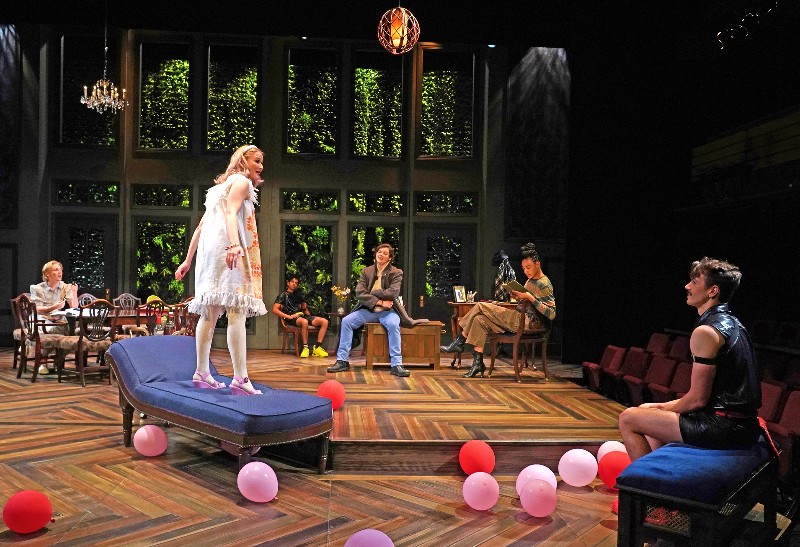
Playwright Halley Feiffer had the clever idea of taking Anton Chekhov’s play Three Sisters and kicking it into the 21st century.
It’s one of those creations that begins with the question, “What if?” What if Chekhov were writing his play today using raw contemporary language with lots of profanity, slang, catchphrases, snarky attitudes, and even a few funny jokes backed by some hot early 2000s music?
The result is Moscow Moscow Moscow Moscow Moscow Moscow being presented at the University of Michigan’s Arthur Miller Theatre. Director Ryan Dobrin takes the idea a bit further in his production at the university by setting Chekhov’s characters “in a more diverse context,” according to a program note. The result is a comic mashup that draws, again according to the program notes, on the affectations of Paris Hilton and the Kardashians as well as on gender-identity issues.
The playbill also comes with a warning that the play may be “upsetting, offensive, or triggering for some audience members” and advises caution. Some of those who might respond that way are fans of Chekhov who might not appreciate what Feiffer has done to his play.
Encore Musical Theatre’s Fats Waller tribute "Ain’t Misbehavin'" struts and swaggers
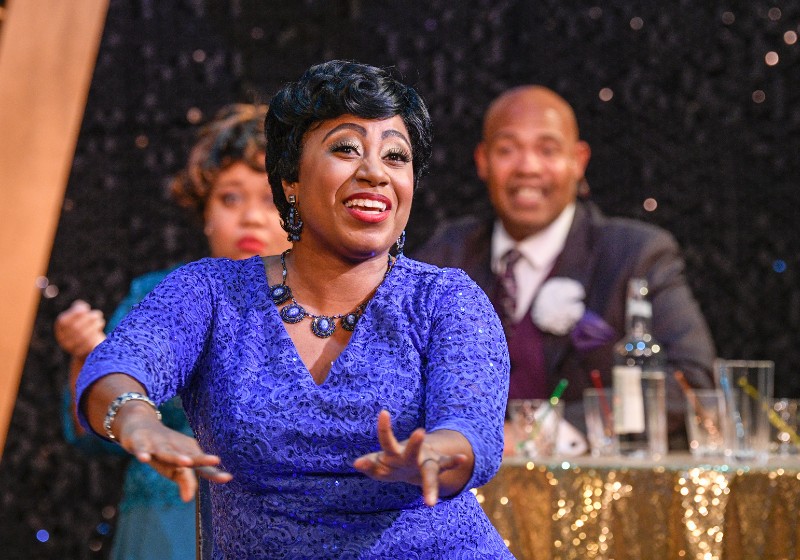
Thomas Wright “Fats” Waller was only 39 years old when he died of pneumonia but in that short life the effervescent showman, composer, singer, master pianist, and amiable comic packed in a lot of life.
The Broadway hit Ain’t Misbehavin’, conceived by Richard Maltby Jr. and Murray Horowitz, is not a musical biography of Waller but rather an infectious presentation of his music and a rollicking recreation of the pianist's uptown swing.
The Encore Musical Theatre Company is taking its audience back to a swank Harlem club to experience that other time and place. Director and choreographer Gerry McIntyre presents a polished, sassy, and moving production that swings from happy-go-lucky and downright sexy to a bit more reflective tone. That arc gives a portrait of Waller that explains his life more than a lecture ever could.
The musical "Hands on a Hardbody" explores class empathy, big personalities, and personal connections

Some narrative setups just prove too irresistible to pass up.
In the case of the musical Hands on a Hardbody, a group of down-on-their-luck Texans gather at a car dealership for the chance to win a new red Nissan pickup truck. To win, they must stand for days on end with one hand touching the vehicle at all times, and they each have their own motivations for committing to this grueling exercise—which means, of course, everyone has a unique story to tell.
Think of it as A Chorus Line for economically struggling Southerners.
This boiled-down assessment, as it happens, additionally hints at some of the inherent challenges of the show: how to toe the line delicately between caricatures and big personalities; between blue state talking points and red state realities; and between appropriation and a heart’s-in-the-right-place effort at inclusion.
But the play vacillates in its ability to pull off this delicate balance, and its structure makes the musical a series of character sketches more than a cohesive dramatic story arc with high stakes.
Yes, each person has his/her reasons for wanting the truck so badly, but in the end, we know everyone will probably be OK if they lose this contest, too.
Inspired by a 1997 documentary of the same name, and now being staged by Penny Seats Theatre in Ann Arbor's Burns Park, the two-and-a-half-hour Hands on a Hardbody premiered on Broadway in 2013 and features a book by Pulitzer Prize winner Doug Wright (I Am My Own Wife) and music by Phish frontman Trey Anastasio and Amanda Green.
Emilio Rodriguez asks who gets to decide what’s offensive in his play "God Kinda Looks Like Tupac"

NOTE: "God Kinda Looks Like Tupac" has been pushed back from its original opening date to August 5 due to illness.
Emilio Rodriguez, whose play God Kinda Looks Like Tupac opens at Ann Arbor's Theatre Nova on July 29 August 5, says his theater career started early.
Very early.
Donning his mother’s high heels and appropriating her broom and a funnel, he performed “one-kid adaptations of The Wizard of Oz” in the family’s living room.
Perhaps one reason why a movie with the famous line "There's no place like home" resonated with Rodriguez is that he is a self-described “military brat” who grew up on the move. Rodriguez says he didn’t have a sense of hometown until he moved to Detroit in 2012 to teach high school English and drama for AmeriCorps. One thing that informs all his work, he says, is “a loose sense of the idea of home. The plays are not necessarily set in someone’s home [but ask] … how do people make a sense of home?”
When Rodriguez began teaching, he saw the classroom as “an extension of home. … In the younger grade levels, kids spend more time at school than with their families.” He also found that friendships with colleagues gave him a sense of connection, of a mock family, a home.
Rodriguez set God Kinda Looks Like Tupac in a Detroit high school, where a white art teacher in the mostly Black school has been targeted as insensitive. A Latino teacher offers a suggestion to the art teacher that might help him keep his job: It’s Black History month, she tells him, and there’s a competition; if a student he enters can paint something in celebration of the month and win, chances are good he will be named Teacher of the Year.
And who would fire Teacher of the Year?
What Price Genius? Theatre Nova’s "Relativity" explores the complicated life of Albert Einstein
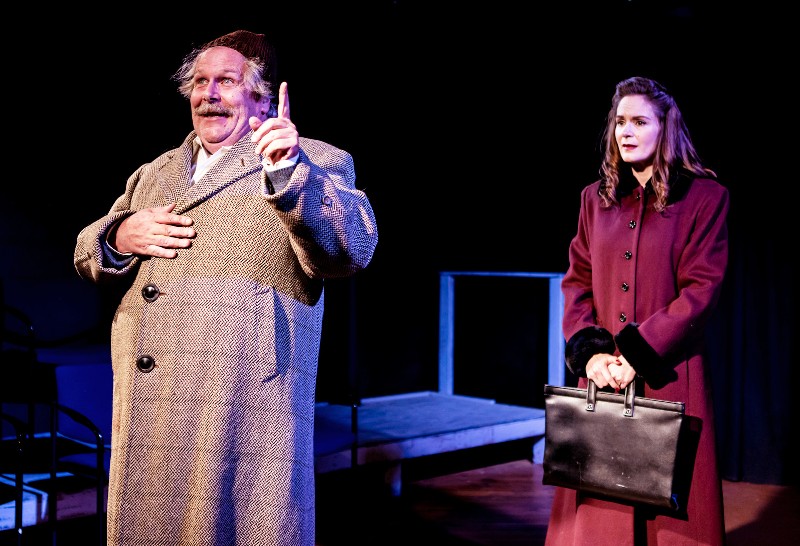
Can a great man also be a good man? What do the words great and good mean?
This is the theme of Mark St. Germain’s play Relativity, which explores the character of physicist Albert Einstein, who has become the very definition of genius.
Germain takes a troubling decision by Einstein and its impact on his professional and personal life to explore the complex balances and compromises that people make to follow their passions, in Einstein’s case a passion that would change forever the way we look at the universe.
Carla Milarch directs the Theatre Nova production of Relativity, which strikes a complex balance of its own, weighing gentle comedy against serious inquiry into the compromises Einstein made to follow his genius.
Wherever You Are: Geoff Sobelle’s experimental theater piece explores what it means to be "Home"
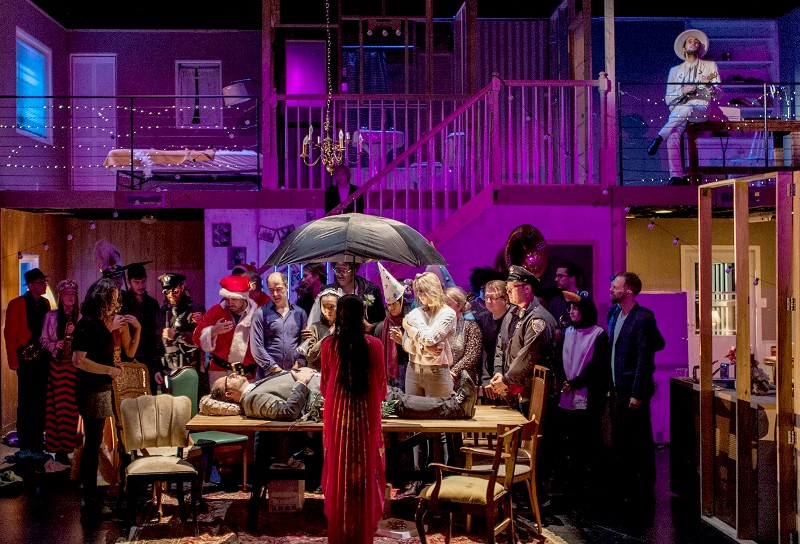
Among the many, many things that have changed over the last two years is our sense of “home.”
While traditionally associated with comfort and family and love, our homes became claustrophobic prisons of a kind during the pandemic as we holed up to protect ourselves and each other; and though home provided many of us with some semblance of safety, we were nonetheless terrified of being with others and of this dangerous thing that was out in the world that we didn’t yet understand.
So although the UMS presentation of Geoff Sobelle’s Home—a genre-defying hybrid of theater, dance, and interactive performance art that often has the feel of a live silent film—had been originally scheduled for April 2020, seeing it instead this past weekend during its two-day run at the Power Center inevitably meant the audience watched it with COVID-era eyes.
That’s not to say we collectively arrived at the venue with a jaundiced, wary perception filter firmly in place. But for many of us, the abstract idea of “home” as an emotional palette has expanded to include some darker hues, right alongside the more conventionally bright, cozy, warm ones.
Encore Theatre premieres a new musical based on the life of silent star Lon Chaney

In addition to presenting classic American musicals and lively cabaret shows, The Encore Theatre in Dexter is also doing its part to expand the musical theater repertoire with premiere presentations of new musicals.
This month, Encore is presenting the world premiere of A Thousand Faces, a musical bio on the life of silent-screen star Lon Chaney.
As with any new theatrical production, the first presentation is an opportunity for the creative team to make adjustments and test run the audience's response to the new material. The book writer, the composer, the lyricist, and the director will tweak this show as the weeks go on.
They’re off to a good start but audiences might be a bit surprised by the show’s approach to telling the Chaney family story.
Along with the great silent comedy stars, Lon Chaney's name and films still resonate with audiences. He was the man of a thousand faces. He was an actor who hid himself in characters that were both physically and psychologically damaged. Chaney was famous for his performances in The Hunchback of Notre Dame, The Phantom of the Opera, The Unholy Three, Laugh, Clown, and He Who Gets Slapped. He did his own shock-producing makeup and twisted his face and body into a dozen different contortions. But he could also show his own face and give a tough performance in the contemporary war drama Tell It to the Marines.
After a scene of Chaney adjusting his Quasimodo makeup and trying on tortured facial expressions, A Thousand Faces takes us back to Chaney’s youth, because this isn’t a story about making horror movies, it’s about family.
Antoinette Chinonye Nwandu’s “Pass Over” is a Black Lives Matter-era translation of Exodus and "Waiting for Godot"
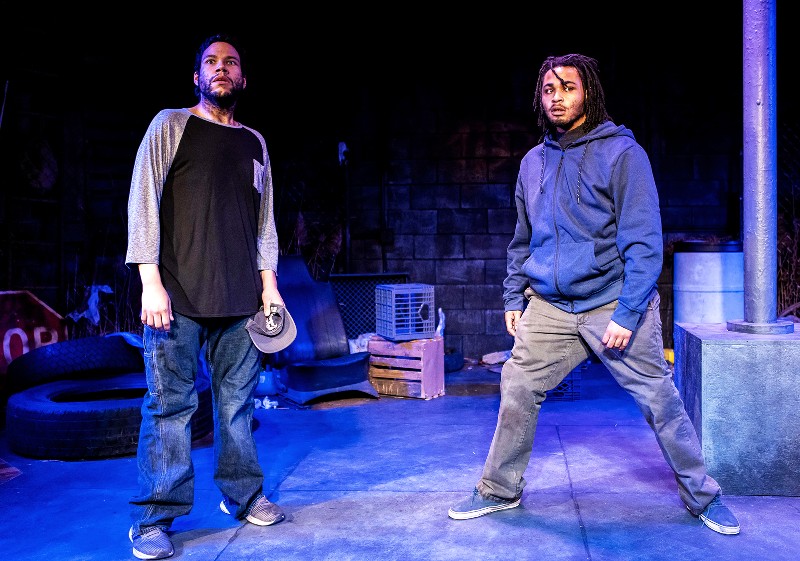
The time is ripe for Antoinette Chinonye Nwandu’s Pass Over, now on stage at Theatre Nova.
The play was the show that officially reopened Broadway last August; we’re fast approaching the holiday of the same name, which commemorates the Jews’ emancipation from slavery in Egypt; and given the reignited culture wars of this mid-term election year—fueled in part by debate about critical race theory—Nwandu’s powerful reimagining of Beckett’s Waiting for Godot, with two young Black men in the lead roles, feels like the theatrical version of lightning in a bottle.
Pass Over (run time 80 minutes) focuses Moses (Justin Montgomery) and Kitch (Dan Johnson), who live a hardscrabble Groundhog Day-like existence on a heavily policed city block. They regularly perform rituals like a secret handshake; Moses says “Kill me now” when he wakes up each morning, and Kitch replies, “Bang bang”; and they each name wished-for items on their “Promised Land Top Ten” lists.
But even as the men speak and dream of escape—using language so rife with curses and the n-word that it soon feels more centered on sound and music than meaning—they’re not going anywhere; and a streetlight pole that looms like Vladimir and Estragon’s tree, in this new context, haunts the play’s action with the ominous suggestion of lynching. Building on this idea, a cartoonishly obsequious, lost, “golly gee” white man (Kevin O’Callaghan) enters the scene, wearing a light-colored suit and carrying a picnic basket full of food for his mother; and a racist, violent white cop called Ossifer (also played by O’Callaghan) appears now and then to keep Moses and Kitch in their place, both literally and figuratively.
Penny Seats Theatre Company's "The Actors" is a comedic and emotional look at processing parental loss
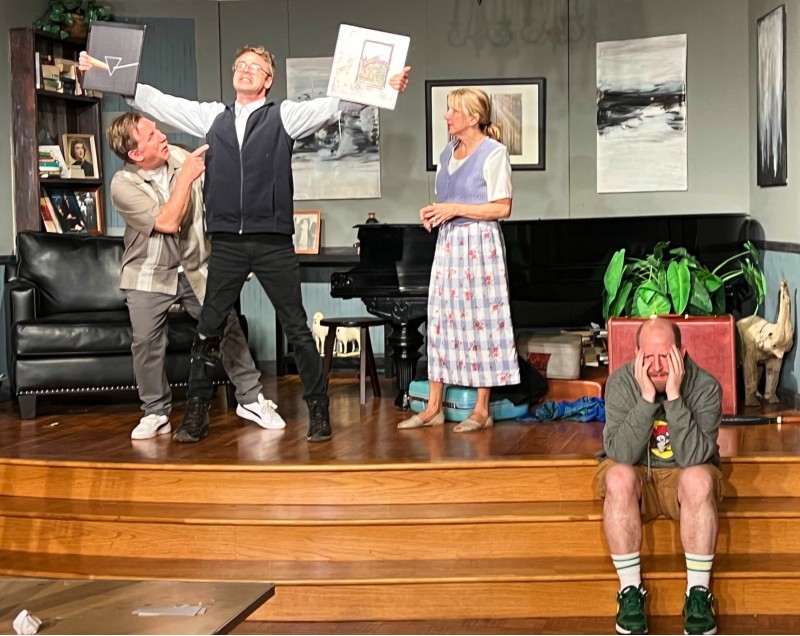
Early in Ronnie Larsen’s play The Actors—staged by the Penny Seats Theatre Company at the Stone Chalet Event Center in Ann Arbor—a character says, “Theater’s weird. Families are weird.”
Ronnie, the comedic drama’s main character (who notably shares the playwright’s name, and is affectingly played by Brandy Joe Plambeck), voices this idea while explaining why he’s looking to hire a man and a woman to spend a few hours a week in his apartment, playing the roles of his deceased parents. He's lonely and has decided to use his inheritance money to hire actors that might make him feel cared for and connected again. Ronnie provides a family history and specific, remembered scenes for the actors to play out, inviting them to improvise.
Inevitably, though, things go hilariously off-the-rails, as the boundaries between reality and pretend get increasingly fuzzy. Ronnie’s stand-in father Clarence (Robert Schorr) and mother Jean (Diane Hill) develop an attraction for each other; Clarence moves in, after being kicked out of his real home; and Jean’s real grown son (David Collins) inserts himself as Ronnie’s pretend older brother Jay, which makes the real Jay’s (Jeffrey Miller) unannounced visit all the more painfully awkward. But Jay’s arrival also brings new information to light that throws Ronnie’s family memories, and motives, into question.
Homeless kids find a voice in U-M's production of "somebody's children"
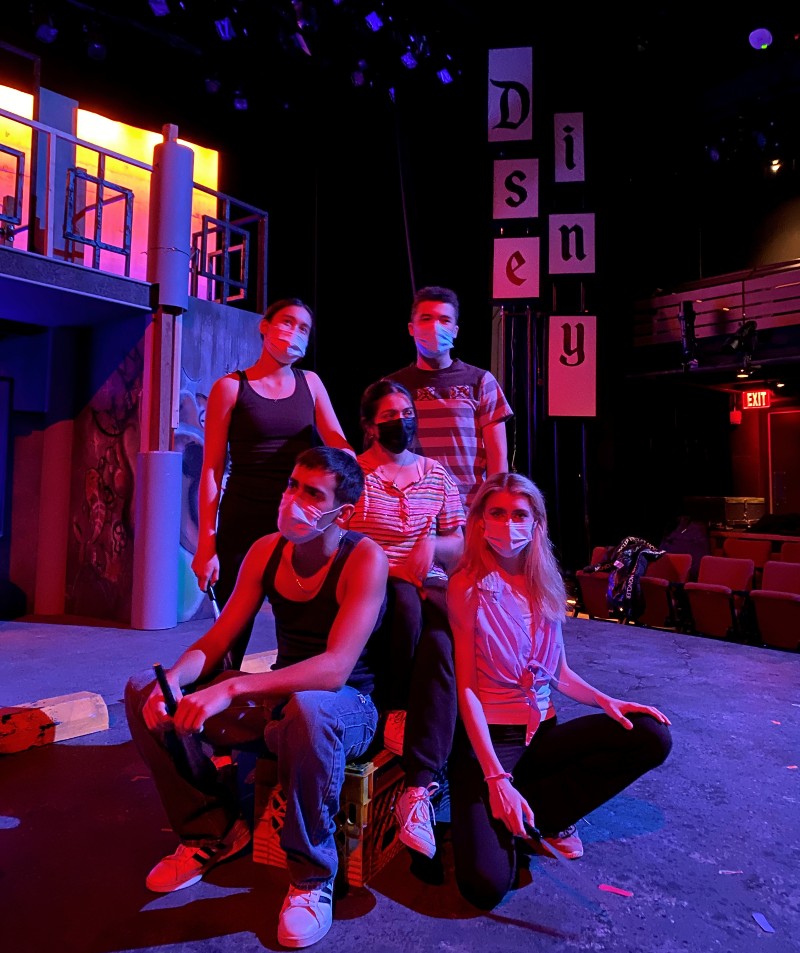
Thirteen years ago, the Found Spaces Theater Company in Los Angeles commissioned a play from José Casas about homelessness. “I was really struggling with the play,” he recalls. “It was like a bad afterschool special with two-dimensional characters.”
Then the artistic director gave Casas an article about homeless kids who lived in motels, kids with fathers who were absent or deceased, who live near Disneyland and suffer “earth-shattering tragedies each day.“ At once, he was inspired by the thought of some children enjoying a theme park, while children in abject poverty were near enough to hear their laughter.
And somebody’s children took shape quickly. The University of Michigan is staging a production at the Arthur Miller Theatre through April 2.


































